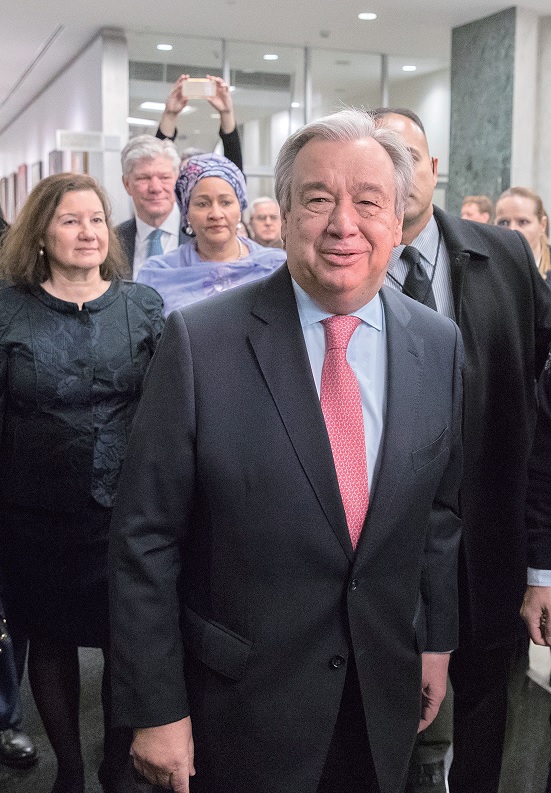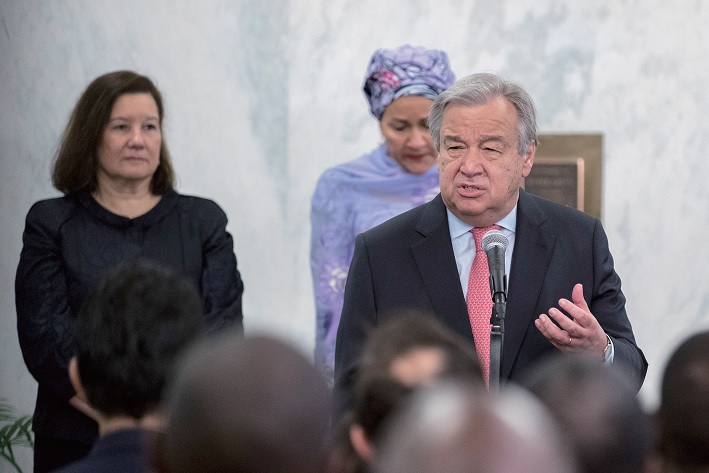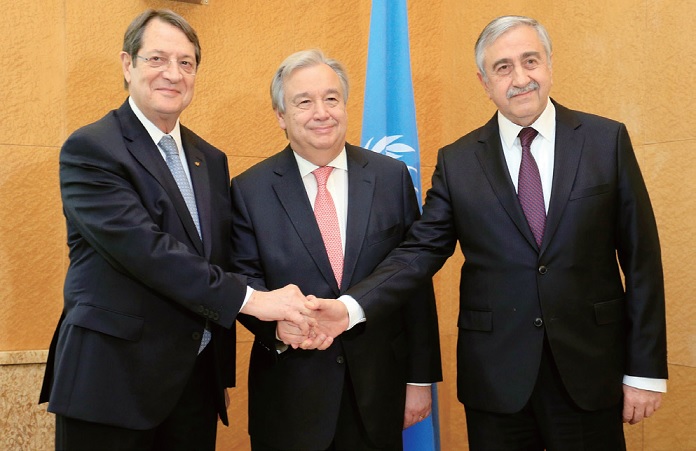2017年1月 封面故事
聯合國候任秘書長古特雷斯在宣誓儀式上的講話
(二零一六年十二月十二日)
主席先生,
秘書長先生,
諸位閣下,
女士們、先生們,
感謝各位的溢美之辭。會員國對我的信任和信心,讓我深感榮幸。我將堅定遵循《聯合國憲章》的原則和宗旨。
首先,我要向潘基文秘書長致以敬意。
秘書長,
你講求原則,領導有方,通過促成《二零三零年可持續發展議程》,致力於和平與安全,發起將人權置於聯合國工作核心的倡議,幫助確定了聯合國今後的方向。
在你的領導下,全世界對具有歷史意義的氣候變化《巴黎協定》作出承諾,並在創紀錄的短時間內予以批准。我堅信,這個勢頭是無法阻擋的。
主席先生,
我二十一年前宣誓就職葡萄牙總理時,全世界一派樂觀。冷戰結束了;有人稱之為歷史的終結。他們堅信,我們將生活在一個和平穩定的世界上,共用經濟增長和繁榮。
可是,冷戰的結束並非歷史的終結。相反,在一些地方,歷史只是被一時凍結而已。舊秩序一旦瓦解,歷史便瘋狂地反撲。
各種潛伏的矛盾和緊張關係重新浮現。新起戰端激增,舊日戰火重燃。權力關係模糊不清,導致不可預測性和有罪不罰現象日益增多。
各種衝突比以往任何時候都錯綜複雜,彼此盤根錯節。衝突造成駭人聽聞的違反國際人道主義法行為和踐踏人權行為。人們被迫逃離家園,規模之大為數十年所未見。此外,還出現了一個新威脅——全球恐怖主義。
各種大趨勢,包括氣候變化、人口增長、快速城市化、糧食無保障和缺水等問題,加劇了資源爭奪,使緊張局勢和動盪狀況不斷升級。
主席先生,
與此同時,二十年來技術進步非比尋常。全球經濟實現增長;基本社會發展指標有所改善。絕對貧困人口所占比例大幅減少。
但是,全球化和技術進步也加劇了不平等問題。許多人被落在後面,在發達國家也是如此,那裡有數百萬舊的工作崗位已經消失,而新的工作機會對許多人來說可望而不可及。青年失業率暴增。同時,全球化擴大了有組織犯罪和販運行為的觸及範圍。
所有這一切加深了民眾與政治體制之間的鴻溝。在一些國家,不穩定狀況、社會動亂甚至暴力和衝突日益嚴重。
現在選民往往拒絕接受現狀,拒絕接受付諸公投的任何政府提案。許多人不僅對本國政府,而且對包括聯合國在內的全球體制喪失了信心。

主席先生,
現在,全世界許多人正在恐懼心理的驅使下作出決定。
我們一定要理解他們的焦慮,滿足他們的需求,但同時不忽視普世價值觀。
現在是重建人民與國家和國際領導人關係的時候了。現在是領導人傾聽民聲的時候了,是領導人展現出對本國人民、對我們大家都依賴的全球穩定的關切之心的時候了。
現在也是聯合國採取行動的時候了。聯合國必須認識到自己的不足之處,改革自己的工作方法。聯合國是多邊主義的基石,為數十年的相對和平作出了貢獻。但是現在的種種挑戰已經超出我們的應對能力。聯合國現在必須準備作出改變。
我們最嚴重的不足,我是說我們整個國際社會的嚴重不足,是我們對預防危機無能為力。
聯合國是從戰火中誕生的。今天,聯合國必須為和平而存在。
主席先生,
要做好預防,就必須從問題的根源入手,而且要貫穿聯合國三大支柱,即:和平與安全、可持續發展和人權。我們所做的一切工作,均須以此為重心。
要做好預防,就必須更好地支持各國加強本國機構,增強社會復原力。
做好預防,還要重新將人權作為本身理應實現的價值來追求,而不是達到政治目的的手段。必須讓所有人,包括各類少數群體,都不受歧視,都能享有全部人權——公民權利、政治權利、經濟權利、社會權利及文化權利。
婦女和女童保護和賦權是重中之重。性別平等是實現發展的關鍵所在,而且越來越多的事實證明,性別平等在建設和平及維護和平方面也具有至關重要的作用。
預防並不是一個新概念,而是聯合國締造者對我們提出的要求。這是挽救生命、減少人類痛苦的最佳辦法。
在預防未能奏效的地方,我們必須加大解決衝突的力度。
從敘利亞、葉門、南蘇丹和其他地方的嚴重危機,到巴以衝突等長期未決爭端,我們都需要調解、仲裁和創造性外交發揮作用。
在我的斡旋工作中,只要於事有補,我隨時準備親自參與解決衝突,同時認識到會員國在這方面起主導作用。
主席先生,
我們面臨的諸多挑戰規模巨大,因此我們必須攜手合作,深入持續地推進聯合國改革。我要強調變革的三大戰略重點,即促進和平的工作、對可持續發展的支援、以及內部管理。
在聯合國和平行動中,所有工作人員,不分男女,正冒著生命危險,英勇無畏地作出自己的貢獻。然而,他們受命前去維持和平的地方,往往根本沒有和平可以維持。必須擬訂更明晰的維和概念,必須就維和範圍達成共識,以此開啟刻不容緩的改革。
我們必須創建和平連續體,從預防和解決衝突,到維持和平、建設和平及實現發展,連為一體。我們必須在最近三項報告的結論以及大會和安全理事會同時通過的決議基礎上進一步開展工作。在保持和平這一新概念的指引下,現在是我們一起對聯合國和平與安全戰略、行動機制及架構進行全面改革的時候了。
在這一改革中,還必須審視我們的反恐怖主義工作,並在聯合國三十八個有關實體間建立更好的協調機制。
主席先生,
在聯合國旗幟下服務的人員當中,竟有人對我們本應保護的物件犯下令人髮指的性暴力和性剝削罪行。聯合國系統在這方面的預防和應對工作還做得不夠。
我將同會員國密切合作,從架構、法律和行動各層面採取措施,真正落實零容忍政策。我們必須確保工作透明,有責必究,並向受害者提供保護和有效補救。

主席先生,
改革議程的第二項重要內容是聯合國在實現可持續發展目標方面向會員國提供支援,以此表明全球團結一致,幫助會員國兌現絕不讓任何一個人掉隊的承諾。
為此,我們將把發展重新置於工作的中心,並在總部和國家兩級對聯合國發展系統進行全面改革。在此過程中,必須講求領導力、協作、實效和問責。會員國最近就此進行了討論,我們將在討論結果的基礎上做出努力。
我們還須從危機一開始就讓人道主義界和發展界更密切協作,為受影響的社區提供支援,解決結構性影響和經濟影響,幫助防止出現新一輪不斷惡化的脆弱和不穩定局勢。人道主義反應、可持續發展及保持和平是同一個三角形的三邊,缺一不可。
這關係到世界人道主義峰會商定的“新工作方式”。為此,我們需要在三個層面加大問責力度,包括在每一機構執行各自任務層面,在各機構參與聯合國系統工作層面,以及在整個聯合國系統層面,都加大問責力度。要樹立牢固的問責風氣,還必須有切實有效的獨立評估機制。

主席先生,
第三個關鍵領域是管理改革。我們將在現有努力的基礎之上再接再厲,並落實近期制定的各項舉措。但是,讀一下有關聯合國工作人員和預算的細則和條例,可能會讓人覺得,其中一些規定是為了阻止我們有效完成任務,而不是為了便利我們有效完成任務制定的。
我們需要就簡化流程、下放權力和靈活辦事形成共識。如果向實地派遣一名工作人員要花九個月,對誰都沒有好處。
聯合國需要靈活行動,講求效率和實效。聯合國必須更加著力于交付成果而不是拘泥於程式;更注重服務於人而不是講究繁文縟節。
要樹立問責之風,須有強有力的業績管理,還必須切實有效地保護舉報人。
僅僅把工作做好還不夠。我們一定要用每個人都明白的方式,更好地宣傳我們所做的工作。我們需要大幅改革宣傳戰略,把工具和平臺更新換代,讓世界各地的人們都能聽到我們的聲音。
最後,管理改革必須確保我們儘早實現性別均等。當初的目標是到二零零零年在聯合國工作人員中實現男女任職比例均等。十六年過後,我們離這一目標依然很遠。
我承諾尊重性別均等,就從我對高級管理小組和行政首長理事會成員的所有任命開始。到我任期結束時,我們應該在副秘書長和助理秘書長級別、包括在特別代表和特使級別完全實現性別均等。
我們需要制定明確的路線圖,確立全系統遠在二零三零年之前實現性別均等的若干階段性目標。
最後,對加強聯合國工作的任何投入都必須考慮到工作人員。我期待再次與在全球一百八十個國家執行任務的八萬五千多名男女工作人員並肩工作。他們當中許多人在很困難、甚至危險的環境下工作。他們具有專業作風、專門知識和奉獻精神,是聯合國最為重要的資源,也是一種必須要關心、發展、有效利用的資源。我需要傾聽他們的呼聲。
主席先生,
我們生活的世界錯綜複雜。聯合國無法憑一己之力取得成功。夥伴關係必須成為我們的戰略核心。我們應該謙卑地承認其他行為體起到不可或缺的作用,還應時時充分認識到聯合國所擁有的獨特號召力。
如果沒有會員國的積極參與,沒有民間社會、國際金融機構、私人投資者和金融市場的貢獻,我們的人道主義和發展工作就起不了多大作用。如果沒有各區域組織特別是非洲聯盟的參與,一些調解努力與和平行動就不可能進行。
我們最近與合作夥伴一道發起許多重要倡議。現在我們必須確保先落實這些倡議,然後再提出新的倡議。
然而,我們的戰略中缺失的一個環節是與青年合作。長久以來,在作出影響青年未來的決策時,沒有讓青年參與。
我們在會員國、青年問題特使和民間社會的支援下已經開展大量工作,我們必須在此基礎上進一步努力。但這不能是由老一輩人討論年青一代問題的一種舉措。聯合國必須賦權青年,擴大青年在社會中的參與,增加青年的教育、培訓和就業機會。
主席先生,
當今時代的悖論是,社會聯通性雖然越來越強,但各社會卻日益支離分散。越來越多的人生活在自己的小天地裡,無法認清他們個人與整個人類大家庭的關聯。
問題最終歸結到價值觀上。我們要讓子孫後代所繼承的世界以《聯合國憲章》體現的價值觀為依歸,這些價值觀是和平、正義、尊重、人權、寬容和團結。各大宗教都信奉這些原則,我們在日常生活中也都努力身體力行。
對這些價值觀的威脅往往源於恐懼。我們對我們所服務的各國人民承擔的職責是,一起努力,讓人們擺脫彼此恐懼,做到相互信任。要讓人們信任把我們連為一體的價值觀,信任為我們提供服務和保護的各個機構。
在我盡全力為全人類服務時,我對聯合國的貢獻將以喚起這種信任為目標。
謝謝大家。

-----------------------------------------------------------------------------------
Secretary-General-designate António Guterres’ remarks to the General Assembly on taking the oath of office
(12 December, 2016)
Thank you very much for all your kind words. I am deeply honoured by the trust and confidence Member States have placed in me, and determined to be guided by the purposes and principles of the Charter.
First of all, I would like to pay tribute to Secretary-General Ban Ki-moon. Secretary-General, your principled leadership has helped to chart the future of the United Nations — through the 2030 Agenda for Sustainable Development; through your commitment to peace and security; through your initiative to put human rights at the heart of our work. Under your direction, the world committed to the historic Paris Agreement on climate change — and ratified it in record time. I strongly believe this momentum is unstoppable. Dear Secretary-General Ban Ki-moon, it is an honour to follow in your steps, defending the same values that unite us. Thank you very much.
Twenty-one years ago, when I took the oath of office to become Prime Minister of Portugal, the world was riding a wave of optimism. The cold war had ended, and some described that as the end of history. They believed we would live in a peaceful, stable world with economic growth and prosperity for all. But, the end of the cold war wasn’t the end of history. On the contrary, history had simply been frozen in some places. When the old order melted away, history came back with a vengeance.
Hidden contradictions and tensions resurfaced. New wars multiplied and old ones reignited. Lack of clarity in power relations led progressively to greater unpredictability and impunity. Conflicts have become more complex — and interlinked — than ever before. They produce horrific violations of international humanitarian law and human rights abuses. People have been forced to flee their homes on a scale unseen in decades. And a new threat has emerged — global terrorism. Megatrends — including climate change, population growth, rapid urbanization, food insecurity and water scarcity — have increased competition for resources and heightened tensions and instability.
At the same time, the last 20 years have seen extraordinary technological progress. The global economy has grown; basic social indicators have improved. The proportion of people living in absolute poverty has fallen dramatically. But, globalization and technological progress have also contributed to growing inequalities. A lot of people have been left behind, even including in developed countries where millions of old jobs have disappeared and new ones are out of reach for many. In many parts, youth unemployment has exploded. And globalization has also broadened the reach of organized crime and trafficking.
All this has deepened the divide between people and political establishments. In some countries, we have seen growing instability, social unrest — even violence and conflict. A little bit everywhere, voters now tend to reject the status quo, and whatever Government proposal is put to a referendum. Many have lost confidence not only in their Governments, but in global institutions — including the United Nations.
Fear is driving the decisions of many people around the world. We must understand their anxieties and meet their needs, without losing sight of our universal values. It is time to reconstruct relations between people and leaders — national and international; time for leaders to listen and show that they care, about their own people and about the global stability and solidarity on which we all depend. And it is time for the United Nations to do the same: to recognize its shortcomings and to reform the way it works. This Organization is the cornerstone of multilateralism, and has contributed to decades of relative peace. But, the challenges are now surpassing our ability to respond. The United Nations must be ready to change.
Our most serious shortcoming — and here I refer to the entire international community – is our inability to prevent crises. The United Nations was born from war. Today, we must be here for peace.
La prévention exige que nous nous attaquions aux causes profondes à travers les trois piliers des Nations Unies: la paix et la sécurité, le développement durable et les droits humains. Cela doit être la priorité dans tout ce que nous faisons.
La prévention exige que nous soutenions plus les pays dans leurs efforts pour renforcer leurs institutions et rendre leurs sociétés plus résilientes.
Il s’agit aussi de rétablir les droits humains comme une valeur fondamentale qui doit être défendue en tant que telle, et non à des fins politiques autres. Tous, y compris les minorités de tout genre, doivent pouvoir jouir de l’ensemble des droits humains – civils, politiques, économiques, sociaux et culturels – sans aucune discrimination.
Protéger et autonomiser les femmes et les filles est primordial. L’égalité des genres est essentielle au développement, et le rôle clé qu’elle joue dans la consolidation et le maintien de la paix devient de plus en plus indéniable.
La prévention n’est pas un concept nouveau : c’est ce que les fondateurs des Nations Unies nous ont demandé de faire et elle constitue le meilleur moyen de sauver des vies et d’alléger la souffrance humaine.
Mais lorsque la prévention échoue, nous devons redoubler d’efforts pour régler les conflits.
Des crises les plus aïgues, en Syrie, au Yémen, au Soudan du Sud et ailleurs, aux disputes de longue date, y compris le conflit israélo-palestinien, il nous faut davantage de médiation, d'arbitrage et de diplomatie créative.
Je suis prêt à m’engager personnellement à travers mes bons offices dans la résolution des conflits mais lorsque cela constitue une plus-value, tout en reconnaissant le rôle de premier plan des États Membres.
L’échelle des défis auxquels nous sommes confrontés nous contraint à travailler de concert, pour réformer les Nations Unies de manière approfondie et continue. Je souhaiterais esquisser ici trois priorités stratégiques de cette réforme: dans notre travail en faveur de la paix; notre appui au développement durable; et notre gestion interne.
Les femmes et les hommes travaillant dans les opérations de maintien de la paix des Nations Unies nous apportent une contribution héroïque au péril de leurs vies. Toutefois, ils se voient souvent confier la tâche de maintenir une paix qui n’existe pas. Nous devons donc nous entendre sur ce que recoupe le travail de maintien de la paix, afin de jeter les bases d’une réforme urgente.
Nous devons créer un fil conducteur pour la paix qui relie la prévention et la résolution des conflits, le maintien et la consolidation de la paix, et le développement. Nous devons nous appuyer sur les conclusions des trois récents rapports, ainsi que les résolutions parallèles de l’Assemblée générale et du Conseil de sécurité. Le moment est venu pour nous tous, inspirés par le nouveau concept de pérennisation de la paix, de nous engager dans une réforme globale de la stratégie, des opérations et des structures des Nations Unies visant la paix et la sécurité.
Cette réforme doit également inclure un examen de notre travail dans le domaine de la lutte antiterroriste, et un meilleur mécanisme de coordination entre les 38 entités des Nations Unies qui sont concernées.
The United Nations system has not yet done enough to prevent and respond to the appalling crimes of sexual violence and exploitation committed under the UN flag against those we are supposed to protect. I will work closely with Member States on structural, legal and operational measures to make the zero-tolerance policy for which Secretary-General Ban Ki-moon has fought so hard a reality. We must ensure transparency and accountability and offer protection and effective remedies to the victims.
The second key element of the reform agenda concerns the United Nations support to Member States in achieving the Sustainable Development Goals and the objectives of the Paris Agreement, an expression of global solidarity, with their promise to leave no one behind. To do this, we will reposition development at the centre of our work, and engage in a comprehensive reform of the United Nations development system, at Headquarters and country levels. This must involve leadership, coordination, delivery and accountability. We will build on the outcome of the recent discussions among Member States.
We must also bring the humanitarian and development spheres closer together from the very beginning of a crisis to support affected communities, address structural and economic impacts and help prevent a new spiral of fragility and instability. Humanitarian response, sustainable development and sustaining peace are three sides of the same triangle.
This approach relates to the new way of working agreed at the World Humanitarian Summit. To achieve this, we need more accountability, on the level of each individual agency carrying out its mandate, but also its contribution to the work of the United Nations system and of the system as a whole. A strong culture of accountability also requires effective and independent evaluation mechanisms.
The third key area is management reform. We will build on existing efforts and implement the recent initiatives that were approved. But, looking at United Nations staff and budgetary rules and regulations, one might think that some of them were designed to prevent, rather than enable, the effective delivery of our mandates.
We need to create a consensus around simplification, decentralization and flexibility. It benefits no one if it takes nine months to deploy a staff member to the field. The United Nations needs to be nimble, efficient and effective. It must focus more on delivery and less on process; more on people and less on bureaucracy. A culture of accountability also requires strong performance management and effective protection for whistle-blowers.
And it is not enough just to do better. We must be able to communicate better about what we do, in ways that everybody understands. We need a substantial reform of our communications strategy, upgrading our tools and platforms to reach people around the world.
Finally, management reform must ensure we reach gender parity sooner rather than later. The initial target for the equal representation of women and men among United Nations staff was the year 2000. Sixteen years later, we are far from that goal. I pledge to respect gender parity from the start in all my appointments to the Senior Management Group and the Chief Executives Board.
By the end of my mandate, we should reach full gender parity at the Under-Secretary-General and Assistant Secretary-General levels, including special representatives and special envoys. We need a clear road map with benchmarks and time frames to achieve parity across the system, well before the target year of 2030. And the same concern applies to regional diversity.
Finally, any investment in a stronger United Nations must take staff into account. I look forward to working once again alongside over 85,000 men and women carrying out our mandate in 180 countries across the globe. Many of them work in difficult and sometimes dangerous circumstances. With their professionalism, expertise and dedication, they are the United Nations’ most important resource, a resource that has to be cared for, developed and used efficiently, and whose voice needs to be heard.
We live in a complex world. The United Nations cannot succeed alone. Partnership must continue to be at the heart of our strategy. We should have the humility to acknowledge the essential role of other actors while maintaining full awareness of our unique convening power.
Our humanitarian and development efforts would be insignificant without the active involvement of Member States and the contributions of civil society, international financial institutions, private investors and even financial markets. Several mediation efforts and peace operations would not be possible without the engagement of regional organizations, particularly the African Union, our most relevant international regional partner, both in peace and security and in development.
Recientemente hemos puesto en marcha diferentes iniciativas importantes junto con nuestros socios. Nos corresponde ahora llevarlas a buen término antes de iniciar otras nuevas.
Pero en nuestra estrategia hay un vacío: el labor con los jóvenes. Durante demasiado tiempo, los jóvenes se han visto excluidos de la toma de decisiones que afectan a su futuro.
Debemos aprovechar la labor realizada en el pasado con el apoyo de los Estados Miembros, el Enviado para la Juventud y la sociedad civil. Pero esta no puede ser una iniciativa donde los ancianos sean quienes hablen de las nuevas generaciones. Las Naciones Unidas deben empoderar a los jóvenes y aumentar su participación en la sociedad y su acceso a la educación, la formación y el empleo.
Today´s paradox is that, despite greater connectivity, societies are becoming more fragmented. More and more people live within their own bubbles, unable to appreciate their links with the whole human family. In the end, it comes down to values, as was said so many times today. We want the world our children inherit to be defined by the values enshrined in the United Nations Charter: peace, justice, respect, human rights, tolerance and solidarity. All major religions embrace these principles, and we strive to reflect them in our daily lives.
But, the threats to these values are most often based on fear. Our duty to the peoples we serve is to work together to move from fear of each other, to trust in each other. Trust in the values that bind us and trust in the institutions that serve and protect us.
My contribution to the United Nations will be aimed at inspiring that trust, as I do my best to serve our common humanity.
Thank you very much.





